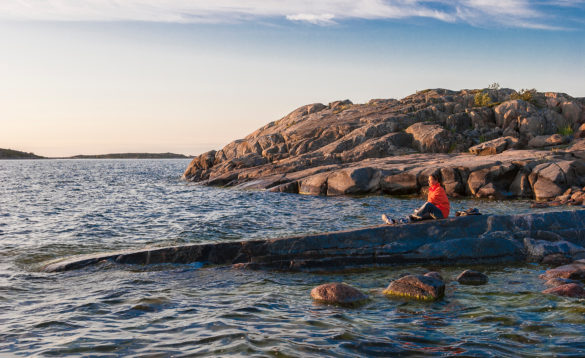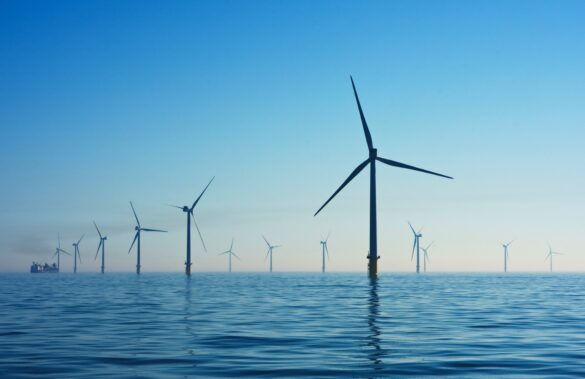Sustainable development as a roadmap for the Islands of Peace
Objectives
The Development and Sustainability Agenda for Åland was established within the framework of the Bärkraft.ax, a network created for all citizens, organizations, authorities and companies in Åland Islands. The Agenda consists of one vision and seven strategic targets for 2030, concerning both environmental and social sustainability. It is part of the plan to make Åland totally sustainable by 2051, a target set by the Åland Parliament and Provincial Government in 2014.
- The vision: everyone can flourish in a viable society on the islands of peace
- The seven strategic development goals:
- Happy people whose inherent resources increase;
- Everyone feels trust and has real possibilities to participate in society;
- All water is of good quality;
- Ecosystems in balance and biological diversity;
- Attractive for residents, visitors and business;
- A significantly higher proportion of energy from renewable sources, plus increased energy efficiency;
- Sustainable and mindful patterns of consumption and production.
The Agenda has been adopted by the Parliament and integrated into governmental budgeting. The targets have concrete examples of actions each citizen can contribute with, are regularly measured through specific indicators, and have supporting structures for the realization of the Agenda.
With the understanding that nature constitutes the foundation of human existence, the Development and Sustainability Agenda for Åland is Åland’s contribution to the implementation of the 2030 Agenda. It sheds light on concepts such as 1) happiness and flourishing as something deeper than material well-being; 2) viability in providing for our needs without future generations, poorly treated cheap labor, or other living things in the form of animals and nature having to pay the price; 3) peace in nature and history.
Achieved outcomes
In April 2019, the Development and Sustainability Agenda for Åland won the premier round of the European Sustainability Award in the category public entities under 100,000 inhabitants. Winners were chosen by the European Commission in a total of seven different categories and Åland was the only winner from the Nordic countries.
Åland Islands adopted the back-casting/ABCD-method. The method is based on the desired state where we wish to be in the future, where we are now, and how we can bridge the gap between the situation today and the desired state. This method provides a guideline or matrix of four sequential steps: A) Defining a vision (or desired position in the future); B) Analyzing the current position in relation to the vision and identifying the gap and main challenges between (A) and (B); C) Brainstorming possible short and long-term actions and solutions that can contribute to bridging the gap between (A) and (B); and D) Prioritizing possible actions and defining a concrete action plan.
The daily implementation of the Agenda is supported by eight interacting process areas, which have been identified as appropriate while working to define the seven strategic development goals. The eight interacting process areas are:
- Education, health, work and care;
- Structures for influence, impartiality and creation of meaning;
- Nature, culture, infrastructure and transport;
- Energy and climate;
- Consumption, production, financing and investment;
- Land and water;
- Ecosystems and biological diversity;
- Business community and tourist destination.
Each process areas contributes to the achievement of one or more strategic development goals. Employing an agile way of working in network enables cross-boundary processes, overcoming the inherent limitations of a traditional silo mentality. The objective is to promote synergy between the mobilized resources for the realization of the Agenda.
Annual Status Reports are published to monitoring and reporting. The 2020 edition is the fourth report that provides an overview of the current situation and uses the latest statistics available to track the progress of each target in time. The Status Reports are produced by the Coordination and Reporting Working Group, adopted by the Development and Sustainability Council, presented at the annual Sustainability Meetings, and submitted to the Parliament, where the normal political scrutiny applies.
- The first report (2017) focuses on a system perspective, contributing to a structured overview and identifying progress, challenges, and critical success factors.
- The second report (2018) deepens the analysis of the targets, providing indicators to all of them. It comprehends the view and role of key social actors, including all municipalities, civil society associations and the business community. Thematically, it covers the physical structural development as well as the use of land and water. In the target 6, for example, the report shows that in 2018 approximately 30% of energy use had a renewable origin and about 20% of electricity used was locally produced from renewable sources.
- The third report (2019) shows the change in progress in several sectors of Åland, with a focus on climate change. It also stresses areas where progress is insufficient, such as gender equality.
Annual Sustainability Meetings are organized to inform, promote interaction, and collect feedback from different stakeholders. The annual fora are open to stakeholders and general public of Åland Islands and it is in its sixth edition. During the meeting, good examples and lessons learned of working for the realization of the Agenda, from all sectors of society, are presented.
Main actors involved
The Development and Sustainability Agenda for Åland is the result of a collective work established within the framework of the multisectoral and public network Bärkraft.ax. It consists of a comprehensive consultation process opened for everyone and supported by an expert panel. A true bottom-up, inside out process.
In order to elaborate the Development and Sustainability Agenda for Åland, a ‘vision-workshop’ was organized in which everyone living and working in the islands was invited to put forward proposals. A panel of 59 experts was requested to formulate strategic goals necessary to implement the vision. A draft document compiling all the proposals was discussed in different groups and in open meetings for the general public, before being finally adopted.
The network Bärkraft.ax was established in early 2016 as the hub for the coordination of the work to realize the Agenda. The network is open for the participation of all parts of society and all people who wish to contribute actively to a viable and sustainable Åland. It has continued its activities after the adoption of the Agenda, what enables a permanent dialogue between public and private sectors and civil society.
In addition, the Development and Sustainability Council is responsible for following up the implementation of the Agenda and has been appointed to take responsibility for Bärkraft.ax. The Head of Government is both member and chair of the Council, which meets at least three times a year. The Council is composed of at least 8 and up to 14 members, appointed by the government for a 2-year term and chosen among leading people from various sectors, including representatives of agricultural producers, businesses, and academia. The Council is member of Finnish Commission for Sustainable Development.
The Åland Parliament has the overall political responsibility for the realization of the Agenda. The Åland government is responsible for acting proactively as the catalyst and coordinator for the realization of the Agenda:
- The process of drafting the Åland budget takes the Agenda into account;
- The government presents an annual report regarding the status of the Agenda to the Parliament;
- The government acts as an example by thoroughly applying the principles of sustainability to its own working practices;
- The government is responsible for maintaining a fundamental infrastructure, including digital and physical forums, for the network Bärkraft.ax.
All municipalities, authorities, and other public sector bodies as well as all business and associations are expected to take active part in the realization of the Agenda. They should act as examples by thoroughly applying the principles of sustainability to their own working practices.
The implementation of the Development and Sustainability Agenda for Åland is continuously coordinated with developments in the EU, the Nordic countries, and Finland. Åland is part of the Nordic cooperation for sustainable development and Åland is represented in Finland´s Commission for Sustainable Development.



